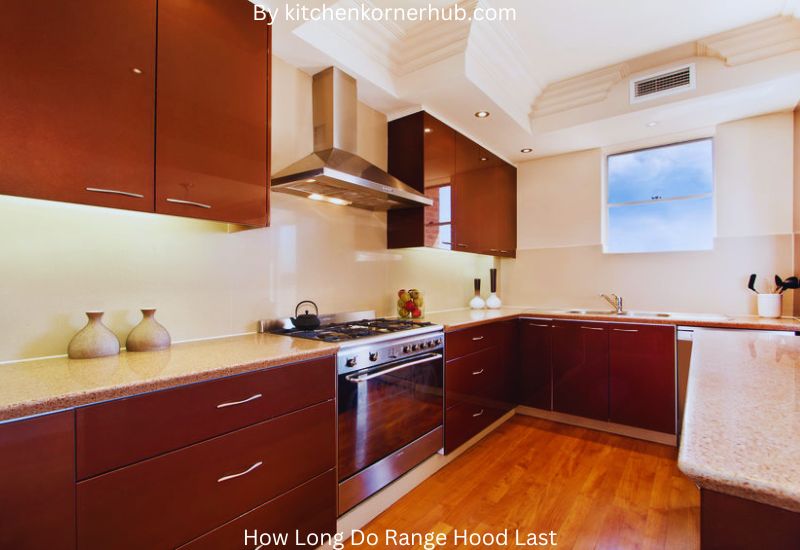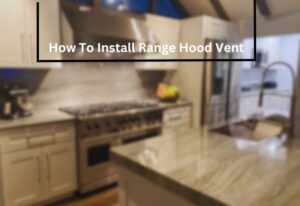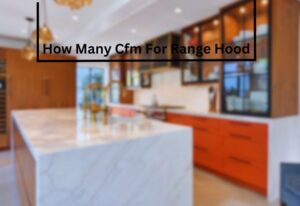Have you ever wondered how long those handy range hoods in your kitchen will last? Well, you’re not alone! Range hoods are essential appliances that help keep our kitchens free of smoke, odors, and grease. But, like all things, they too have a lifespan.
How Long Do Range Hood Last? Range hoods typically last anywhere from 10 to 20 years, depending on factors like usage and maintenance. Regular cleaning and proper care can extend their lifespan. It’s important to keep filters and fans in good condition for optimal performance and longevity.
In this article, we’ll explore the lifespan of range hoods in simple terms. We’ll discuss factors that can influence their longevity and offer tips on how to extend their useful life. So, if you’re curious about when it might be time to replace your trusty range hood, keep reading to find out more!
“The Lifespan of Range Hoods: What to Expect”

Range hoods are an essential part of our kitchens, quietly doing their job to keep our cooking spaces fresh and clean. But have you ever wondered how long they’re supposed to last? Let’s delve into the lifespan of range hoods and what you can expect from them.
Average Lifespan:
On average, a well-maintained range hood can last anywhere from 10 to 15 years. However, this can vary depending on factors like usage frequency and the quality of the range hood.
Cheaper models might have a shorter lifespan, while high-quality ones tend to last longer.
Maintenance Matters:
To extend the lifespan of your range hood, regular maintenance is key.
Cleaning the filters, removing grease buildup, and ensuring proper ventilation will not only keep it working efficiently but also prolong its life. Neglecting maintenance can lead to premature wear and tear.
Signs of Trouble:
Just like any other appliance, range hoods will give you warning signs when they’re nearing the end of their life.
These signs may include strange noises, decreased suction power, or even a burning smell. If you notice these issues, it might be time to consider a replacement.
Upgrading Options:
When it’s time to replace your range hood, you’ll have various options to explore.
Newer models often come with improved features like quieter operation, better energy efficiency, and enhanced filtration. Choosing an upgrade that suits your needs can breathe new life into your kitchen.
DIY vs. Professional Installation:
Installing a range hood may seem like a DIY project, but it’s often best left to professionals. A proper installation ensures optimal performance and safety.
It’s worth the investment to hire a qualified technician to set up your new range hood.
Environmental Impact:
As with any appliance, it’s essential to consider the environmental impact of disposing of your old range hood.
Many parts can be recycled, so be sure to check local recycling options or donation centers that might accept it. This eco-friendly approach can help reduce waste.
Future Innovations:
The world of range hoods is continually evolving, with manufacturers constantly introducing innovative features.
As technology advances, we can expect range hoods to become even more efficient and user-friendly, making our cooking experiences more enjoyable.
“Prolonging the Performance: Range Hood Longevity Tips”

Regular Cleaning and Maintenance:
One of the key ways to ensure your range hood’s longevity is through regular cleaning and maintenance.
Grease and dirt can accumulate over time, affecting its efficiency. Clean the filters, vents, and surfaces regularly using mild detergent and warm water. Make it a habit to wipe down the exterior as well to prevent grime buildup.
Proper Ventilation:
Ensuring proper ventilation in your kitchen is essential for your range hood’s performance and lifespan.
Make sure the ductwork is clear and unobstructed. A well-ventilated kitchen helps the range hood work more efficiently, preventing the buildup of excess heat and grease.
Use the Right Filters:
Range hoods come with different types of filters, such as mesh or charcoal filters. Choose the appropriate filter for your cooking needs and replace it when necessary.
Mesh filters can be cleaned, but charcoal filters need replacement. Using the right filter keeps your range hood functioning optimally.
Avoid Overheating:
Overheating can strain the motor and other components of your range hood. Be mindful not to leave your range hood running for extended periods when it’s not needed. Turn it off once you’re done cooking to prevent unnecessary wear and tear.
Monitor for Unusual Noises:
Unusual noises, such as rattling or grinding, can be signs of underlying issues with your range hood. Regularly listen for any abnormal sounds while it’s in operation, and if you notice anything unusual, consider having it inspected by a professional to prevent further damage.
Proper Installation:
Ensure that your range hood is installed correctly by a qualified technician. A proper installation not only guarantees better performance but also reduces the risk of premature wear and tear. It’s worth investing in a professional installation to avoid future complications.
Upgrade When Necessary:
Finally, if your range hood is showing signs of aging or no longer effectively removing smoke and odors from your kitchen, consider upgrading to a newer model. Newer range hoods often come with improved technology and energy-efficient features, which can enhance their longevity and performance.
“Factors Influencing Range Hood Durability”

A range hood is an essential appliance in the kitchen, designed to improve indoor air quality by removing smoke, odors, and grease generated during cooking. Its durability is crucial, ensuring it continues to function efficiently over the long term.
Several factors can influence the durability of a range hood, and understanding these factors can help you make informed decisions when purchasing and maintaining this kitchen appliance.
Build Quality:
The durability of a range hood largely depends on its construction. High-quality materials like stainless steel and durable finishes can resist corrosion and wear, ensuring a longer lifespan for the appliance.
It’s important to inspect the build quality before making a purchase.
Ventilation Power:
The efficiency of a range hood is directly related to its ventilation power. A more powerful motor can handle a greater volume of air, removing smoke and odors more effectively. Hoods with powerful ventilation systems tend to last longer as they can maintain their performance over time.
Maintenance and Cleaning:
Regular maintenance and cleaning play a significant role in extending the lifespan of a range hood. Grease and debris can accumulate in the filters and ducts, reducing the appliance’s efficiency. Routine cleaning can prevent this buildup and ensure the hood functions optimally.
Proper Installation:
Incorrect installation can lead to premature wear and tear. Ensure that the range hood is installed by a qualified technician who follows the manufacturer’s guidelines. Proper installation not only ensures durability but also safety.
Climate and Environment:
The environment in which the range hood operates can affect its durability. Kitchens with high humidity levels or extreme temperatures may require specialized hoods designed for such conditions.
Choosing a range hood that suits your kitchen’s environment can enhance its longevity.
Usage Habits:
How you use the range hood can also impact its durability. Excessive cooking without the hood, cooking at high temperatures regularly, or neglecting to use it when needed can put additional strain on the appliance.
Using it as intended and in moderation can prolong its lifespan.
Brand Reputation:
The reputation of the brand and the warranty offered can be indicative of the hood’s durability. Established brands often invest in research and development, producing products that are built to last.
A longer warranty can provide peace of mind and financial protection in case of unexpected issues.
“When to Replace Your Range Hood: Signs of Wear and Tear”

A range hood is an essential appliance in your kitchen, as it helps to remove smoke, grease, and odors generated during cooking.
However, like any other appliance, it can wear out over time. Knowing when to replace your range hood is crucial for maintaining a safe and efficient kitchen environment. In this guide, we’ll explore the signs of wear and tear to keep an eye on.
Reduced Performance
One of the first signs that your range hood may need replacing is reduced performance. If it no longer effectively removes smoke and odors, even at the highest setting, it might be time for a new one. Reduced airflow can indicate a clogged filter or a failing motor.
Unpleasant Odors Lingering
If you notice lingering cooking odors even after using your range hood, it’s a clear sign that something isn’t working correctly. This could be due to a malfunctioning fan or a filter that needs replacement. Ignoring this issue can lead to a less enjoyable kitchen environment.
Excessive Noise
An increase in noise levels from your range hood can be an indicator of problems. If it’s suddenly become louder or is making strange rattling or grinding sounds, it may be a sign of a worn-out motor or damaged fan blades.
Rust and Corrosion
Inspect the exterior and interior of your range hood regularly. Rust and corrosion can weaken the structure and affect its functionality. If you notice significant rusting, it’s a sign that your range hood has seen better days.
Visible Damage
Obvious physical damage, such as cracks in the hood or dents, should not be ignored. These issues can compromise the effectiveness of your range hood and even pose safety hazards. Replacing it may be the safest option.
Inefficient Lighting
Range hoods often come with built-in lighting to illuminate your cooking area. If the lights flicker or no longer provide adequate illumination, it could be a sign of electrical problems that need attention.
Age and Outdated Technology
Lastly, consider the age of your range hood and its technology. Older models may lack energy efficiency features or advanced filtration systems found in newer models. Upgrading to a more modern unit can improve both performance and energy savings.
“Comparing Range Hood Types: Which Lasts the Longest?”

When it comes to kitchen appliances, the range hood is often an unsung hero. It plays a crucial role in keeping your kitchen clean and free from unwanted odors, smoke, and grease. However, not all range hoods are created equal, and some last longer than others.
In this note, we’ll explore the different types of range hoods and compare their durability to help you make an informed decision for your kitchen.
Wall-Mounted Range Hoods:
Wall-mounted range hoods are a popular choice for kitchens with a stove against the wall. These hoods are relatively durable and can last for many years.
They are usually made of stainless steel, which is resistant to corrosion and easy to clean. Regular maintenance, such as cleaning the filters, can extend their lifespan further.
Under-Cabinet Range Hoods:
Under-cabinet range hoods are installed beneath kitchen cabinets. They are known for their space-saving design and can also be quite durable.
Like wall-mounted hoods, they are typically made of stainless steel and require routine cleaning to ensure longevity.
Island Range Hoods:
Island range hoods are designed for kitchens with a cooking island. These hoods hang from the ceiling and are a stylish addition to any kitchen.
They can be durable if properly maintained, but their lifespan may depend on factors such as the quality of materials used and the frequency of use.
Downdraft Range Hoods:
Downdraft range hoods are unique as they retract into the countertop when not in use.
While they offer a sleek appearance, their durability may be somewhat compromised due to their complex mechanical systems. Regular maintenance and careful use can help maximize their lifespan.
Ducted vs. Ductless Range Hoods:
Another crucial factor in the durability of a range hood is whether it is ducted or ductless. Ducted range hoods, which vent air outside, tend to last longer because they don’t accumulate grease and odors internally.
Ductless hoods, on the other hand, require more frequent filter replacements and may have a shorter lifespan.
Quality and Brand Matters:
In addition to the type of range hood, the brand and quality of the appliance play a significant role in determining how long it will last. Investing in a reputable brand known for its quality construction and materials can lead to a longer-lasting range hood.
Maintenance Is Key:
Regardless of the type of range hood you choose, regular maintenance is the key to ensuring its longevity.
Clean the filters, grease traps, and fan blades regularly. Follow the manufacturer’s instructions for care and maintenance to keep your range hood functioning efficiently for years to come.
Conclusion
In wrapping up, the lifespan of a range hood can vary. On average, you can expect them to last around 10 to 15 years. However, this can change based on factors like usage, maintenance, and quality. Regular cleaning and proper care can extend its life, while neglect can shorten it. Investing in a high-quality range hood can also make it last longer. So, remember, keeping your range hood neat and clean.
Frequently Asked Question(How Long Do Range Hood Last)
What is the life expectancy of a range hood?
The life expectancy of a range hood largely depends on its quality and how well it’s maintained. Typically, a good quality range hood can last anywhere from 10 to 20 years or even longer. However, this can vary. If you have a cheaper or lower-quality range hood, it may not last as long.
Regular maintenance, such as cleaning the filters and motor, can help extend its lifespan. So, investing in a high-quality range hood and taking good care of it can ensure it serves you well for many years.
How often should a range hood be replaced?
Range hoods don’t need to be replaced as often as some other kitchen appliances. In general, it’s a good idea to consider replacing your range hood if it starts to show signs of significant wear and tear, becomes noisy, or is no longer effective at removing cooking odors and smoke.
This can happen anywhere from 10 to 20 years after installation. However, if you notice any safety issues, like electrical problems or damaged wiring, it’s essential to replace it immediately to avoid potential hazards in your kitchen.
What is the disadvantage of range hood?
One disadvantage of a range hood is that it can be costly to purchase and install initially, especially if you opt for a high-end model with advanced features. Additionally, running a range hood can increase your energy bills slightly due to the electricity needed to power the fan and lights.
Some people also find the noise from range hood fans to be bothersome, although many modern models come with quieter fan options. Finally, if not properly maintained, range hoods can accumulate grease and dirt, which can be challenging to clean and may affect their performance. Regular cleaning and maintenance can help mitigate these disadvantages.
How long do range hood filters last?
The lifespan of range hood filters can vary depending on factors like usage and the type of cooking you do. In general, most range hood filters, whether they are aluminum, charcoal, or mesh, should last you about six months to a year before they need replacement. However, it’s crucial to inspect them regularly and replace them when they appear visibly dirty or clogged.
Filters that are not replaced when needed can lead to reduced efficiency in capturing grease and odors, which could impact the air quality in your kitchen. So, it’s a good practice to keep an eye on your filters and change them as necessary to ensure your range hood continues to work effectively.




